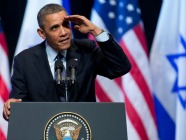
I am writing in the afterglow of President Obama's speech in Jerusalem--an afterglow that lingers on as I re-read his words, and as I recall the boisterous applause that greeted them. I'm content to leave the word clouds and microscopic parsing of his speech to others. Likewise, I'll leave to others the speculation about what might have been, if only this speech had been given years earlier. For my part, I am unrepentantly stopping to savor the moment.
Today President Obama made the most passionate, and compassionate, case for Israeli-Palestinian peace any U.S.
leader has ever made. The case he made was politically pragmatic, grounded in the legitimate security concerns that
define Israelis' existence. It was also grounded, unapologetically and unambiguously, in universal moral truths,
including the indefensibility of the occupation and of denying the Palestinians dignity, security, and
self-determination in their own state.
My organization, Americans for Peace Now, earlier this week called on President Obama to speak directly
to the people of Israel. We wanted him to cut through the fog of anti-Obama, anti-peace propaganda that has
dominated the lives of Israelis for the past four years. We wanted Israelis to see President Obama for who he is:
an American president who shares their security concerns, who fully grasps their skepticism about peace
negotiations and peace agreements, and who understands the existential angst that grips them with respect to
Israel's survival as a state and Israel's survival both as a democracy and a nation defined by its Jewish
character. We believed that only then could Israelis appreciate that this President's approach to
Israeli-Palestinian issues flows from his understanding, at both a pragmatic and moral level, that all of these
things that Israelis care about are ineluctably linked to the achievement of peace and a two-state solution to the
Israeli-Palestinian conflict.
Today I feel hopeful that the people of Israel, having felt the full force of President Obama's honest friendship,
will respond to his challenge to "create the change" they want to see. As the Israeli Peace Now movement declared
in
a giant sign this week, the Israeli people want peace. Polls consistently show that the majority of
Israelis--like their Palestinian counterparts--support a two-state solution to the conflict, broadly along the
lines laid out in the Clinton Parameters and the Geneva Initiative. In the most recent elections, the majority of
Israelis voted for center and center-left parties. Israeli anti-peace extremists and settler rejectionists remain a
minority in the Israeli population, notwithstanding their outsized influence inside Israel's bureaucracy and their
dominance in the new Israeli governing coalition. What is needed today is for Israelis to press their leaders to
stand up to this loud and sometimes violent minority--a minority that is ready to sacrifice Israel's security, its
international standing, its prosperity, and its future in order to pursue its own messianic, extremist goals.
What happens, thus, will depend in part on the Israeli people. It is time to see if Israelis who want peace and who
recognize the truth in President Obama's words--the same Israelis who loudly cheered the speech from inside the
auditorium, from Rabin Square, or from their own living rooms--are ready to stand up and be counted. There can be
little doubt that in the coming days and weeks there will be a provocation--most likely related to approval of
settlement construction. Israelis who believe in peace must shake off their fatigue and cynicism and say: NO. No,
we will not allow settlers to dictate Israel's policies according to their own narrow interests. No, we will not
sit by quietly and allow Prime Minister Netanyahu and his fellow travelers to steal our nation's future. No, we
will not stand by as this government sticks a finger in the eye of our friend and ally in the White House.
What happens will depend, too, on President Obama. With today's speech, he laid the foundation for a new
relationship with the government of Israel--a relationship grounded in greater Israeli popular support for
President Obama. In this context, the next confrontation with the Netanyahu government will be critical. The Obama
Administration has repeatedly allowed its own objections to such provocations to be portrayed as anti-Israel. By
backing down in the face of such portrayals, President Obama has, over and over, dealt Netanyahu domestic political
victories, while allowing his own policies to be discredited and his leadership to be undermined. Now, with the
Israeli people as his ally, President Obama has an opportunity to establish a new dynamic--one in which political
propaganda and crass manipulations are replaced with facts and a clear narrative--one that lays bare the reality
that the Netanyahu government, by pursuing gratuitously provocative, anti-peace policies, is showing unbridled
contempt for President Obama and disdain for the Israel-U.S. alliance.
As President Obama correctly stated, peace is still possible, but its achievement becomes more difficult and more
distant every day, as those who oppose peace race to push the situation on the ground past the tipping point.
Today's speech lays a desperately needed groundwork that, with concerted follow-up from Obama and support from
Israelis, can keep the two-state solution alive and, hopefully, lead to its achievement in the near term.
This article appeared first on March 21, 2013
on Open Zion.